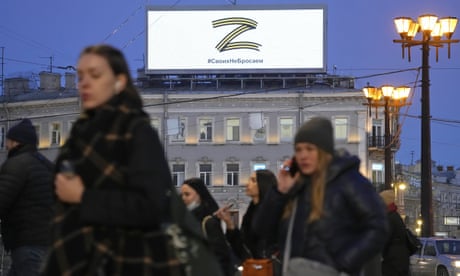- by foxnews
- 08 Apr 2025
‘My mother says I am betraying Russia’: Putin’s invasion divides the generations
‘My mother says I am betraying Russia’: Putin’s invasion divides the generations
- by theguardian
- 14 Mar 2022
- in news

On day three of Russia's invasion of Ukraine, Victoria Gogh realised her mother was slipping away from her.
"I noticed on the phone that mum was starting to parrot the government's narrative about this war - that this was all the fault of Nato, that Russia had no choice but to defend itself," said Gogh, 28, a fashion consultant originally from a small town in Siberia who moved to Moscow.
"It became my mission to change her mind, to show her what was really going on," said Gogh, who has strongly opposed Russia's invasion of Ukraine on her social media channels.
Vladimir Putin's decision to start a war with Russia's neighbour has seen many Ukrainian families torn apart, as their adult men are forced to stay behind and fight while other members of the family flee the violence.
But Russia has also been experiencing its own family rifts - between those who back the war and those who oppose it. Often, that divide runs along generational lines.
"In broad terms, younger Russians are less likely to have anti-Ukrainian sentiments. We have seen that the anti-war protests have also largely involved younger people," said Andrei Kolesnikov of the Carnegie Moscow Center. "A lot of how you perceive the war depends on where you get your news," he said. "If you watch television, you are simply more likely to toe the official line. And older people tend to watch more TV."
In the past, polling has found that television remains the biggest news source for Russians, with more than 60% of the population relying on it for information. Russians over 65 are 51% more likely to watch television than under-25s.
The full force of Russian state media has been mobilised to portray the war as a "special military operation" aimed at liberating Ukraine and protecting citizens in Donbas from Ukrainian "genocide". Videos of Russian bombs hitting cities have been described as staged by the Ukrainian side.
"We see that a majority of Russians appear to support the country's actions, at least the way these actions are presented to them by the media," Kolesnikov said.
He said it was unsurprising, given the sensitivity of the topic, that the war had created tensions between families and friends: "It is very hard for people to accept that their side are actually the bad guys."
Gogh, who decided to leave the country last week after being detained for joining an anti-war protest in Moscow, said she eventually managed to convince her mother, Svetlana, of her country's "devastating role" in the war. "But now I have to persuade my older cousins and uncles. I have got a whole list," she joked. Her "mission" is likely to become even harder.
On Friday, Russia announced a block on Instagram, days after doing the same to Facebook and Twitter. The crackdown on social media - and Russia's few remaining independent media outlets - will further restrict access to outside information on the war and boost the influence of state media.
For others, like Dmitry, a tech consultant in Moscow, the war has already had disastrous consequences for his relationship with his family.
"After the invasion, I wanted to move in with my parents to try to tell them what is really happening," Dmitry said.
During the first week of the war, he went through a daily ritual of showing his parents video clips of Russian shelling of Ukrainian cities and critical reports by independent bloggers and media outlets.
"But none of it had any impact. It actually only made them more convinced that they were right. After a week, I moved back out of the house, and my mother has since texted that I am betraying my country."
The final straw came last Thursday, when his father sent him a news clip that claimed that Wednesday's bombing of a maternity hospital in Mariupol had been staged by the Ukrainian authorities, with actors posing as injured mothers. This conspiracy theory has also been promoted by Russian officials.
"It made me so angry. I am not sure we will ever be able to sit at the same table again," Dmitry said, shrugging. "I think they have been zombified by state propaganda, and they truly see me as an enemy of the state. I have given up."
For some, even their own experiences of being shelled have not been enough to convince their loved ones about Russia's real activities.
The BBC and the New York Times have spoken to Ukrainians who said that their relatives in Russia simply would not believe that their cities were being bombarded.
"My parents understand that some military action is happening here. But they say: 'Russians came to liberate you. They won't ruin anything. They won't touch you. They're only targeting military bases,'" said Oleksandra from Kyiv, describing to the BBC her attempts to explain to her parents that the Ukrainian capital was under Russian attack.
Ilya Krasilshchik, a popular Russian blogger and former tech executive, asked his 110,000 followers on Instagram to send him their own stories of family infighting.
Krasilshchik said he soon received "hundreds of screenshots" from young Russians, showing heated and emotional exchanges with their parents. He decided to post some of those conversations to show young Russians that they weren't alone.
"Clearly, this war has been a very traumatic experience for many families in this country."
- by foxnews
- descember 09, 2016
Ancient settlement reveals remains of 1,800-year-old dog, baffling experts: 'Preserved quite well'
Archaeologists have recently unearthed the remarkably well-preserved remains of a dog from ancient Rome, shedding light on the widespread practice of ritual sacrifice in antiquity.
read more


